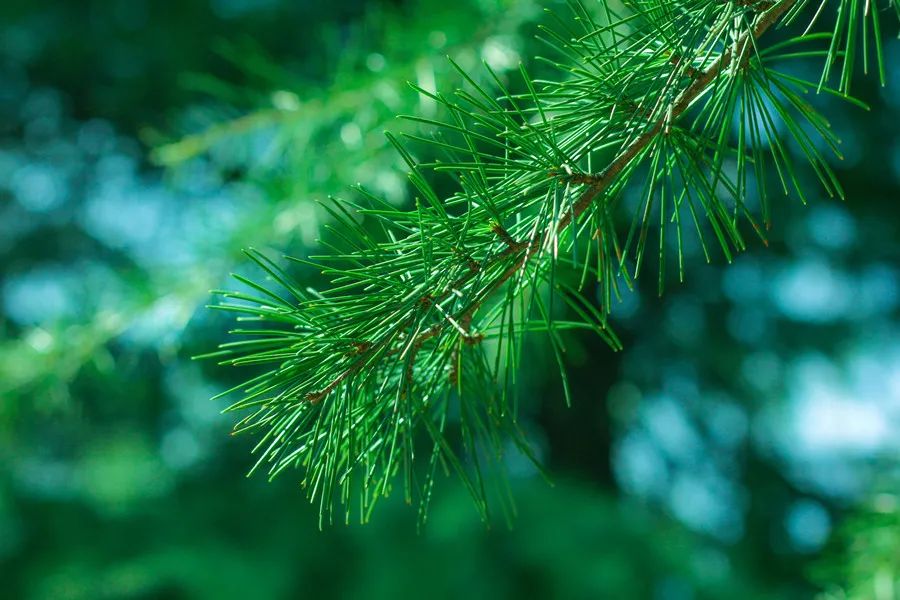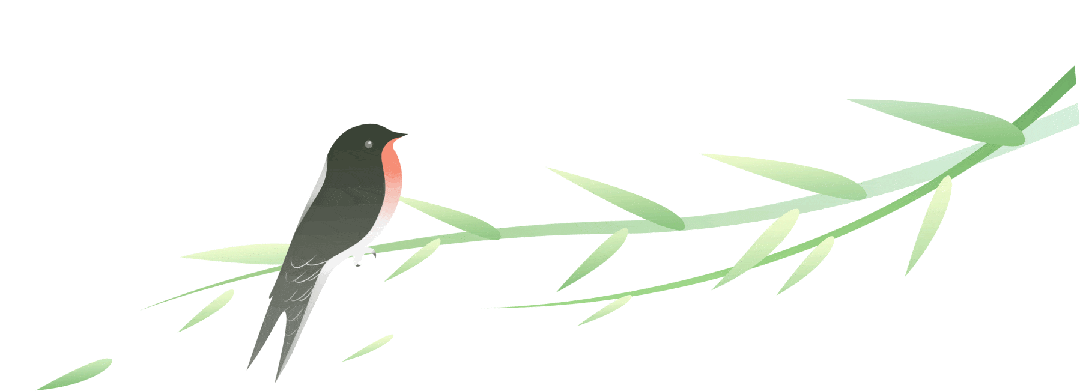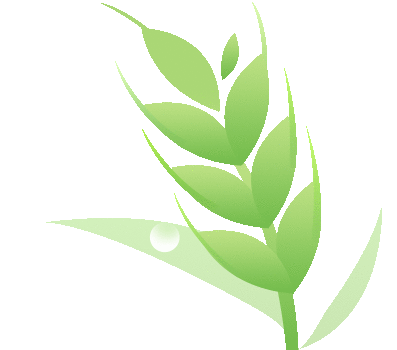The five organs of the human body are interconnected with the four seasons of nature, and the liver, which governs the smooth flow of Qi, corresponds to the spring season when the Yang energy begins to rise. As the rain falls, the humidity in nature increases, which can easily disturb the spleen and stomach. Therefore, during this period, the key to health preservation is to soothe the liver and strengthen the spleen, as the saying goes, “Nurturing the liver in spring prevents illness for the whole year.”
In Guangdong, the rain season indicates the gradual onset of the “return of the south wind.” During this phase, the weather changes frequently, alternating between damp and cold, and warm and dry; the temperature fluctuates, testing the body’s ability to adapt to external climate changes.

Spring Health Preservation Principles 01 Sleep Early and Rise Early
01 Sleep Early and Rise Early
As the saying goes: “When spring arrives and the rain falls, rise early and sleep late.”
With the arrival of spring, the days grow longer and the nights shorter, reflecting the natural increase of Yang energy, which is active, while Yin is passive.
At this time, one should align with the changes of nature by maintaining a routine of “sleeping early and rising early,” which greatly benefits the rise of Yang energy and health in spring.
02 Less Sour, More Sweet, Avoid Spicy
In terms of diet, it is advisable to eat lightly, with less sour and more sweet.
According to the theory of the five elements, the liver belongs to wood, and sour flavors enter the liver; the spleen belongs to earth, and sweet flavors enter the spleen. Wood can control earth, so if the liver is too strong, it can impair the function of the spleen. Therefore, one should minimize sour foods to avoid promoting liver Qi and affecting or damaging spleen and stomach functions.
One can consume foods that are sweet, neutral, and slightly warm to strengthen the spleen and eliminate dampness.
Recommended Ingredients:
For those with insufficient Yang energy, options include glutinous rice porridge, sweet potatoes, Chinese yam, potatoes, eggs, quail eggs, chicken, beef, peanuts, sesame, jujubes, and honey;
For those with Qi and Yin deficiency, it is advisable to eat more carrots, bean sprouts, tofu, lotus root, water chestnuts, lilies, tremella, mushrooms, and duck eggs.
03 Pay Attention to “Spring Wrapping”
After the rain, the moisture in the air increases, leading to temperatures that are not only low but also contain dampness.
It is important to keep warm in daily life; when feeling hot, do not remove outer clothing too early, but rather keep it on for a while longer to gradually adjust the body’s Yin and Yang balance and adapt to the new climate conditions.
Of course, the degree of “wrapping” should vary according to individual constitution; the elderly, children, and those with a cold constitution can wrap more for a few days, while those with a hot constitution can wrap less, considering both temperature and personal feelings.
04 Regulate Emotions
Traditional Chinese Medicine believes that the liver governs growth and activity, enjoys smoothness, and dislikes repression, hence it is called the “stiff organ.” In the five elements, it belongs to wood, representing Yang within Yin, corresponding to the spring energy of nature.
In spring, the Yang energy rises faster than Yin, and liver fire is also on the rise, requiring appropriate release. Since the liver enjoys smoothness and dislikes repression, anger can easily lead to stagnation of liver Qi and blood, resulting in various liver diseases. Therefore, the key to liver health is to maintain a cheerful mood and avoid violent anger or depression.
In line with the upward trend of all things in spring, one should strive to maintain a pleasant mood, communicate more with family and friends, release stress in a timely manner, and alleviate negative emotions. Techniques such as meridian tapping and exercises can also help to smooth the meridians and regulate Qi flow.
The Huangdi Neijing states: “Unrestrained joy and anger harm the organs.” This indicates that uncontrolled emotions can damage organ function.Regulating one’s mood is particularly important for maintaining health; one should strive to be calm, kind, and not overly calculative.
05 Avoid Cold and Damp
Spring is a good time for moderate exercise, which helps to strengthen the body and reduce illness.
However, during exercise, one should avoid cold and dampness, choosing to exercise during warmer daytime hours in sheltered, dry places.
The best forms of exercise are gentle activities such as walking, Tai Chi, Tai Chi sword, Ba Duan Jin, or soft fitness routines.
The amount of exercise should vary by individual, aiming for a light sweat to facilitate the movement of Qi and blood from the body to the skin and limbs, in harmony with the spring energy.
Additionally, walking is particularly emphasized as a gentle exercise. The “Old Old Constant Sayings” states that the benefits of walking are “this is the way to nourish the spirit; walking nourishes the spirit,” “walking relaxes the muscles and strengthens the body,” “after meals, one must walk several hundred steps to disperse the food and aid digestion; walking grinds the stomach and prevents spoilage.” Thus, walking can nourish the spirit, relax the muscles, and aid digestion. This is especially important for the elderly, weak individuals, and those with weak spleen and stomach functions.

Additional Spring Health Practices Early Morning Hair Combing for Qi and Blood
Early Morning Hair Combing for Qi and Blood
The “Theory of Health Preservation” states: “In the three months of spring, comb your hair one to two hundred times each morning.” Spring is characterized by the upward and outward rising of Yang energy, which manifests as pores gradually opening, metabolism becoming vigorous, and growth accelerating.
Combing the hair in spring has the important effect of promoting the flow of Qi and blood, and facilitating the rise of Yang energy. After getting up in the morning, stretching the body and then gently combing the hair one hundred times can instantly refresh the person.
Abdominal Massage to Strengthen the Spleen and Aid Digestion
A simple abdominal massage can strengthen the spleen and stomach and aid digestion, suitable for all ages.
Specific Method: Rub your hands together to warm them, then place your palms on the abdomen, centered around the navel, and massage in a clockwise direction for 36 circles, then counterclockwise for another 36 circles. This can be done while lying down or standing.
It is recommended to perform this after meals, in the morning, or before bed. The abdominal massage is simple and easy to perform, helping to prevent and treat gastrointestinal diseases, and can be used for daily health maintenance.
Mugwort Foot Soak to Eliminate Cold and Damp
With the prevalence of “wind, cold, and dampness,” it is said that “cold arises from the feet.” Soaking the feet in water boiled with mugwort can disperse cold, eliminate dampness, and warm the meridians, making it ideal for disease prevention and health maintenance during this season.
Take 50 grams of mugwort and add it to 3000 milliliters of water, boil vigorously, then simmer for 5 minutes. Allow it to cool to 40-50°C for foot soaking, which is very suitable for those prone to external pathogens or joint pain.
Prevent Dampness for Health
As the weather warms, indoor humidity begins to increase, which can be quite bothersome. Timely use of moisture absorbers and dehumidifiers can help keep the indoor environment dry, or use air conditioning or specialized dehumidifiers to prevent furniture from molding and clothing from becoming damp and causing illness.
Food storage at home should not be overlooked; try to keep food in the refrigerator, and ensure dry goods are sealed properly. For home medicines, in addition to sealing, consider adding safe desiccants.
Acupoint Massage to Regulate Meridians
Yinlingquan (Yin Mound Spring) is an acupoint on the foot Taiyin spleen meridian, which can strengthen the spleen, benefit Qi, and promote the transformation of dampness, addressing issues of dampness or edema in the body. Use the fingertip to press down on Yinlingquan, then begin to knead until a feeling of soreness and distension is felt.
Weizhong (Middle of the Crook) is an acupoint on the foot Taiyang bladder meridian. Massaging this point helps to clear the bladder meridian, eliminate dampness, and also has the effects of relaxing the muscles, promoting blood circulation, and clearing heat and detoxifying. Warm your palms and rub them back and forth over the two sides of the popliteal fossa, intermittently pressing the acupoint until warmth and soreness are felt.
Spring Dietary Recommendations 1Immortal Porridge
1Immortal Porridge
Ingredients:
100-150 grams of glutinous rice, 7-8 fresh scallions with roots, 5 slices of ginger, 10-15 milliliters of aged vinegar, and salt to taste.
Method:
In a clay pot, add an appropriate amount of boiling water, then add glutinous rice and ginger, cooking for 20-30 minutes. Add the fresh scallions and cook until the rice is soft. Stir in the aged vinegar, mix well, and serve hot.
Expert Commentary:
The composition of Immortal Porridge is inspired by the Qing Dynasty’s “Food Canon.” Glutinous rice can strengthen the stomach and Qi, while fresh scallions and ginger are warm and pungent, both having the effect of dispersing and relieving exterior conditions, which can alleviate symptoms such as headaches, sore throat, nasal congestion, runny nose, cough, and phlegm caused by external wind-cold. This porridge is effective in preventing colds, and its ingredients are inexpensive and easy to obtain, making it convenient for daily health maintenance. Note: This dish is a health-preserving medicinal food and should not be used as a cold remedy; if cold symptoms occur, it is advisable to seek medical attention.
2Five Tiger Soup for Dampness
Ingredients:
50 grams of adzuki beans, 30 grams of ginger, 8-10 red dates (pitted), 3 scallions with roots, 1 piece of dried tangerine peel, and brown sugar to taste.
Method:
Wash the ingredients and place them in a pot with an appropriate amount of boiling water, cooking for 30 minutes, then add brown sugar and cook for another 10 minutes.
Expert Commentary:
Five Tiger Soup is an experience formula from renowned TCM physician Li Ke, originally composed of black beans, walnuts, ginger, red dates, and scallions. We have slightly modified it to create the Five Tiger Soup for Dampness, suitable for the southern regions with heavy humidity.
This dish includes adzuki beans to strengthen the spleen and eliminate dampness, dried tangerine peel to promote Qi and eliminate dampness, ginger to relieve exterior conditions, scallions to induce sweating and relieve exterior conditions, and brown sugar and red dates to tonify the middle and support Qi. Together, they can relieve exterior conditions, disperse cold, and eliminate dampness without harming the body’s Yang, making it ideal for the damp and variable weather of spring.
Note:
If you are generally weak, you can add 30 grams of black beans; if you are sensitive to wind and have a runny nose, add 10 grams of fresh perilla leaves; if you have a dry throat, add 5-10 fresh mint leaves. This dish is for cold prevention and should not replace formal cold medications; if cold symptoms are evident, please seek medical attention promptly.
3Salty Citrus Stewed Partridge
Ingredients:
3 salty citrus fruits, 1 partridge, 3 slices of ginger, 150 grams of lean pork, and 3 slices of ham.
Method:
Wash the ingredients and place them in a stewing pot, adding 4-5 bowls of boiling water, and stew for 1 hour before serving.
Expert Commentary:
Citrus fruits are sweet and sour, cool in nature, and enter the lung and stomach meridians, having multiple effects such as regulating Qi, stopping cough, and resolving phlegm. Salted citrus is particularly effective for resolving phlegm and regulating Qi. Partridge has the function of tonifying the middle and resolving phlegm. The combination of citrus and partridge is excellent for resolving phlegm and regulating Qi, and since this dish is slightly cooling, ginger is added to harmonize it, making it especially suitable for sore throats, phlegm in the throat, or cough with excessive phlegm.
Note:
Salty citrus is a high-salt food, so no additional salt is needed for seasoning this soup.
4Fox Nut and Job’s Tears Stewed Chicken Feet
Ingredients:
30 grams of fox nuts, 20 grams of job’s tears, 500 grams of chicken feet, 150 grams of lean pork, and 3 slices of ginger.
Method:
Wash the fox nuts and job’s tears and soak them slightly; clean the chicken feet; clean the lean pork without cutting. Then place all ingredients in a large stewing pot, add 1500 milliliters of cold water (about 6 bowls), cover, and steam for 3 hours. Add an appropriate amount of salt before serving. This quantity serves 3-4 people, and the ingredients can be removed and mixed with soy sauce for serving.
Effects:
Strengthens the muscles and bones, tonifies the spleen, and eliminates dampness.
Indications:
Especially suitable for those with phlegm-damp constitution and Qi deficiency.
5Sand Ginger and Dried Tangerine Peel Carp Soup
Ingredients:
6 grams of sand ginger, 10 grams of dried tangerine peel, 300-400 grams of carp, 4 sprigs of coriander, and 3 slices of ginger.
Method:
Crush the sand ginger; soak the dried tangerine peel to remove the pulp; wash the coriander; clean the carp, removing scales and entrails, and pan-fry in oil until slightly yellow on both sides. First, add the dried tangerine peel and ginger to a clay pot, then add 2500 milliliters of water (about 10 bowls), bring to a boil, add the carp, and simmer on low heat for 2 hours. Add the sand ginger briefly, then season with coriander, salt, and sesame oil before serving. This quantity serves 3-4 people.
Effects:
Regulates Qi and harmonizes the middle, strengthens the spleen, and eliminates dampness.
Indications:
Especially suitable for those with phlegm-damp constitution, Qi deficiency, and Qi stagnation.
6Perilla and Almond Porridge
Ingredients:
10 grams of perilla leaves, 10 grams of almonds, 50 grams of white rice, 3 slices of ginger, and 3 jujubes.
Method:
Wash the white rice, add an appropriate amount of water, and cook with almonds, ginger, and jujubes. When the porridge is nearly done, add the perilla leaves, and let it cool to warm before tasting.
Effects:
Releases the exterior, disperses cold, regulates Qi and harmonizes the stomach, and resolves phlegm and stops cough.
Article Source: Village Communication; If there is any infringement, please contact: 0871-68180018 (infringement removal).

